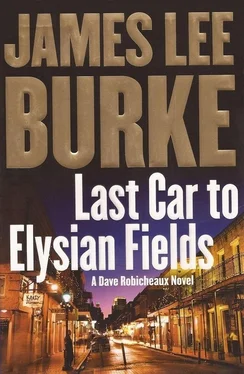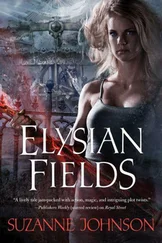Wrong, he thought, lowering his eyes, staring into his lap.
He had set out to murder an innocent, decent man, something he had prided himself on never having done. In addition, the priest had bested him at every turn; that thought didn’t go down well, either. In fact, all of Max’s thoughts were like thongs on a flag rum whipping down on his head.
It was depressing.
He walked outside into the wind and the sweep of stars overhead and the glow of Christmas lights strung around palm trees and started up his rental Honda. He removed a .45 automatic wrapped in an oily cloth from under the seat and set it beside him. As he drove down the two-lane road toward the interstate, he rested his right hand on the .45 and felt his heart rate decrease and his breath grow quiet in his chest.
Then he looked up through the windshield at the stars and for the first time in years found himself addressing an ancient deity with whom he had once had a relationship.
Sir, if you’re going to drop problems of conscience on a man like me at this time in his career, he prayed , would you mind doing so in a gentler manner so I don’t have to feel I’m being crunched inside the iron maiden? I would very much appreciate it. Thank you. Amen.
It rained the next morning and Jimmie Dolan was still in jail, waiting to be arraigned at 11:00 A.M. I had just sat down at my desk when I saw an unmarked vehicle of the kind used by N.O.P.D. pull to the curb and Clotile Arceneaux, wearing Levis, a knit sweater, and blue-jean jacket, get out and run through the rain to the courthouse entrance, her hand raised in front of her brow.
She came into my office, out of breath, her denim jacket streaked with rainwater. She sat down without being invited and said, “Wow! You’re a hard man to catch!”
“I don’t follow you,” I said.
“I left three messages yesterday afternoon,” she said.
“I was in Franklin. Father Dolan is in jail,” I replied.
“Yeah, I know all about it. Guy really walks into wrecking balls, doesn’t he? Look, what have you got on the death of Sammy Figorelli?”
“Nothing.”
“Nothing?”
“He was killed with a .22. He probably knew the shooter. That’s about it,” I said.
I could see her anger at losing months of work rekindling itself in her face. She bit a thumbnail and looked at the rain hitting on the window, then looked back at me. “I came here for another reason as well. In fact, I’m off work today,” she said.
“What is it?”
“You already have breakfast?” she said.
“No,” I lied.
“It’s on me,” she said.
“Your accent seems to come and go.”
“See, I knew you were a smart man.” She smiled, her mouth pressed into a small flower.
We got a take-out order at Victor’s Cafeteria on Main and drove across the bayou to a giant crab-boil pavilion next to an exhibition hall where, believe it or not, Harry James, Buddy Rich, Willie Smith, and Duke Ellington’s arranger, Juan Tizol, performed during the 1950s. The camellias along the bayou were in bloom and looked like red paper flowers inside the grayness of the day, and a tug was moving a huge iron barge loaded with dredged mud through the drawbridge up by Burke Street.
“So what’s the haps?” I said.
“I came down on you pretty hard when you and Purcel scared Fat Sammy out of town,” she replied.
“Your feelings were understandable.”
There was a fried-egg-and-ham sandwich on French bread in her Styrofoam container but she hadn’t touched it. “I talked to Purcel. He told me about your wife’s death,” she said.
I raised my chin to straighten my collar and looked at the tug moving the barge down the bayou.
“So what I’m saying is—”
“Got it. You don’t need to explain.”
“How about shutting up a minute? My husband was killed in Iraq in ‘91.
He was in a tank. The army said he died instantly but I don’t believe them,” she said.
“I’m sorry.”
“For a long time I thought I saw him at a football game or in a bar or in a crowd at a department store. That ever happen to you?”
“No.”
“You’re lucky. What I’m saying, Robicheaux, is I think you’re a good cop and you don’t need another cop yelling at you.” She picked up her sandwich and took a bite out of it. I heard the tug blowing its whistle at the next drawbridge.
“It’s Friday. You want to hang around town, maybe catch dinner and go to a movie?” I said.
“What’s playing?” she asked.
“Really hadn’t checked it out.”
“Father Dolan’s being arraigned at eleven,” she said.
“I thought you’d cut loose of Father Jimmie’s problems.”
“A girl’s got to do something for kicks,” she said, and watched me over the top of her cup while she drank her coffee.
Dale Louviere liked being a city police officer, especially since he had been promoted to plainclothes and given his own office, a travel account, and membership in two civic clubs. The pay was nothing to brag about, but good things happened if a man did his job and accorded people respect and made sure he was available to serve in whatever capacity he was needed.
Anything wrong with that? he asked himself.
He lived a bachelor’s life in a freshly painted bungalow out in the country, enclosed by sugarcane fields, cedar trees, flower beds and vegetable gardens tended by a trusty from the parish stockade. The radical priest’s accusation that he was on a pad still rankled him.
Dale Louviere never accepted a bribe from anyone; he didn’t have to. He took care of his own side of the street and the other things took care of themselves. A mortgage or car loan was approved upon application; his drinks were put on a tab at local bars but he was not expected to ever pay the tab, a land developer gave him forty-yard-line tickets to LSU’s home games whenever he wanted them; and at Christmastime cellophane-wrapped baskets of candy, fruit, and wine were delivered to his door.
The people who owned the sugar mills, drilled the oil wells, and governed the parish’s affairs paid most of the taxes didn’t they? They gave other people jobs. The parish would be a giant rural slum without them. So a civil servant had to pay attention to the needs of rich people who could locate elsewhere anytime they chose.
Anything wrong with that?
Early the same morning Father Jimmie Dolan was to be arraigned, Dale Louviere rose at first light, put on his warm-up suit, and drank coffee and smoked a cigarette at the kitchen table, waiting for the chill to go out of the room. Through the front window he saw a Honda pass on the state road, then return, going in the opposite direction.
He washed his cup and saucer in the sink, put his spare set of house and car keys around his neck on a braided lanyard, and began his early-morning aerobic walk down the state road. Two hundred yards from his bungalow he crossed a wood bridge over a coulee and entered a long, cleared slash between two unharvested cane fields. The rain had quit temporarily, but fog hung like smoke in the cane and the thatch under his feet was sodden and mud coated, squishing each time he took a step, soaking the bottoms of his sweat pants.
One of his shoes went down ankle-deep in water. Bad day for aerobics, he thought.
He heard a car stop on the road. When he looked behind him he saw the Honda again, and a priest with a map spread across his steering wheel, rolling down his window now, his face expressing his obvious need for directions. But secretly Dale Louviere neither liked nor trusted the clergy, and off the clock he gave them no time. He pretended to tie his shoe until he heard the sound of the Honda’s engine thinning in the distance.
It started to sprinkle again and Dale Louviere headed home, walking fast along the edge of the road, through ground fog that welled out of the ditches, his arms pumping the way he had learned in an aerobics class. He wondered if he would ever successfully quit smoking. He had tried many times, but within three days he would be so irritable and agitated his colleagues would toss cigarettes on his desk blotter by way of suggestion. Now the best he could do was pump the smoke out of his lungs and the nicotine out of his blood with a hard, early-morning walk that left his head spinning and his nervous system screaming for another cigarette.
Читать дальше












